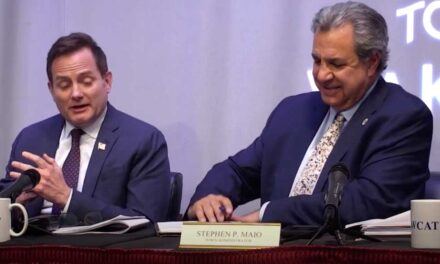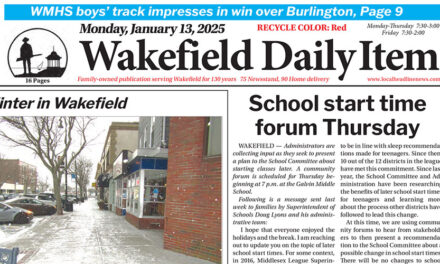By MARK SARDELLA
WAKEFIELD — Three of the five candidates running for two open slots on the School Committee participated in an hour long televised debate last week on WCAT. Colleen Guida, Susan Veilleux and Robert Vincent responded to questions posed by representatives of the local media. Two other candidates, James Horne and Aimee Purcell, did not participate.
The three candidates agreed that Wakefield schools are safe, and all three excused larger than expected school budget increases on the basis of unanticipated and uncontrollable costs. The candidates also agreed that the condition of the high school building remains a serious concern.
Guida said that she opposed arming teachers or deploying metal detectors in response to school safety concerns. She praised ongoing collaboration between school leaders, public safety officials and parents. She also stressed the importance of students having a trusted adult in the schools that they feel comfortable going to.
Vincent agreed that the schools are safe. He pointed to the ALICE program that is in place to teach schools how to handle the threat of an aggressive intruder or active shooter event. He also noted that Wakefield has two School Resource Officers, where many towns have just one.
Veilleux said that based on her experience, the Dolbeare School and the Galvin Middle School are safe. She suggested that based on its age and condition the high school may have issues that could be rectified with modest investments. She suggested audits of the Greenwood and Walton schools to evaluate their security.
On the subject of school budget increases, Veilleux said that she was initially bothered last year when the School Department came to Town Meeting with a 4.7 percent budget increase after promising to hold the line at 4 percent. But after learning that the reasons for the excess increase included contractual salary obligations and uncontrollable special education costs, she understood why it was necessary. She said that it was also important to communicate those reasons to help people understand this year’s 5.5 percent school budget increase.
Guida conceded that “people were rightly upset” when the School Department exceeded the 4 percent limit, but maintained that without unforeseen higher SPED costs, this year’s budget would have been under 4 percent. She noted that Circuit Breaker reimbursements from the state came in significantly lower than promised. She commended school officials for coming together with the Finance Committee early to communicate about the budget increase, which she said was “still reasonable” at 5.5 percent.
Vincent pointed out that in addition to being shortchanged by the state on Circuit Breaker funding, towns like Wakefield are not getting enough from the state through Chapter 70.
“When circumstances are beyond the town’s control,” he said, “we have to do what’s legally required and what’s in the best interests of students.”
Regarding the condition of the high school building, Vincent pointed out that the district has been on “warning” status with respect to its accreditation since 2011. He said that the most recent Statement of Interest submitted by Wakefield to the Massachusetts School Building Authority listed 23 outstanding issues tied to the school’s accreditation, including subpar science lab space. He said that the town needs to continue to both maintain the school and continue to apply for funding from the state to address the more serious building needs.
Guida called Wakefield Memorial High School “a building beyond its prime” and no longer conducive to modern-day learning. She maintained that the high school is the top building priority in the system. She noted that kids are now going from the state-of-the-art Galvin Middle School to an aging high school building. She said that the district should persist in seeking state assistance to address the deficiencies while at the same time educating the community about the condition of the building.
Veilleux noted that the high school issue was one of the reasons that she got into the School Committee race. She said that she was concerned that Wakefield has twice been turned down in its applications for state funding to address the building needs. She said that it was time to “start thinking about other alternatives. We have to do something about the high school.” She cited the accreditation issue and listed some of the building’s deficiencies, especially regarding the science labs.
“Something has to happen to address those major issues,” she said.
All three candidates agreed that the “Learn Anywhere” program needs improvement when it comes to its application to snow days.
Veilleux, who has twins in the fifth grade, said that the program has worked well for one of her kids and not so well for the other. She noted that there are mixed feelings among parents with regard to the program that allows teachers and kids to engage in school work from home on snow days via electronic devices.
“Kids deserve 180 days of instruction,” she said, adding that the execution of the program has been particularly problematic for some students with learning disabilities. Calling it “in theory, a great idea,” she said that more work is needed on its execution.
Vincent said that it was too early to tell if the Learn Anywhere program was an adequate substitute for classroom learning. He said that more feedback would be needed to assess it.
While Guida called Learn Anywhere a “progressive program” and commended the schools for trying it, she conceded that it was “a work in progress.” She said that there were inconsistencies in its application among her four kids and agreed that the program needs improvement.




